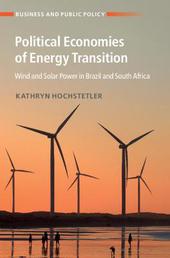
|
Political Economies of Energy Transition: Wind and Solar Power in Brazil and South Africa
Hardback
Main Details
| Title |
Political Economies of Energy Transition: Wind and Solar Power in Brazil and South Africa
|
| Authors and Contributors |
By (author) Kathryn Hochstetler
|
| Series | Business and Public Policy |
|---|
| Physical Properties |
| Format:Hardback | | Pages:270 | | Dimensions(mm): Height 160,Width 235 |
|
| Category/Genre | Environmental economics
Political economy |
|---|
| ISBN/Barcode |
9781108843843
|
| Classifications | Dewey:333.79230968 |
|---|
| Audience | | Professional & Vocational | |
|---|
| Illustrations |
Worked examples or Exercises; 2 Tables, black and white; 10 Line drawings, black and white
|
|
Publishing Details |
| Publisher |
Cambridge University Press
|
| Imprint |
Cambridge University Press
|
| Publication Date |
26 November 2020 |
| Publication Country |
United Kingdom
|
Description
Global climate solutions depend on low-carbon energy transitions in developing countries, but little is known about how those will unfold. Examining the transitions of Brazil and South Africa, Hochstetler reveals how choices about wind and solar power respond to four different constellations of interests and institutions, or four simultaneous political economies of energy transition. The political economy of climate change set Brazil and South Africa on different tracks, with South Africa's coal-based electricity system fighting against an existential threat. Since deforestation dominates Brazil's climate emissions, climate concerns were secondary there for electricity planning. Both saw significant mobilization around industrial policy and cost and consumption issues, showing the importance of economic considerations for electricity choices in emerging economies. Host communities resisted Brazilian wind power, but accepted other forms. Hochstetler argues that national energy transition finally depends on the intersection of these political economies, with South Africa illustrating a politicized transition mode and Brazil presenting a bureaucracy-dominant one.
Author Biography
Kathryn Hochstetler is Professor of International Development at the London School of Economics and Political Science. Her book Greening Brazil: Environmental Activism in State and Society (co-authored with Margaret E. Keck, 2007) received the Lynton Caldwell Prize from the Science, Technology, and Environmental Politics section of the American Political Science Association.
Reviews'Hochstetler's book takes a comprehensive look at two emerging economies that are in the midst of complex and contested energy transitions. An important and timely contribution, it provides valuable insights for the next generation of renewable energy adopters as we move into the decisive decade for transitioning to a low carbon energy system and mitigating climate change.' Joanna Lewis, Provost's Distinguished Associate Professor and Director, Science, Technology and International Affairs Program, Georgetown University 'Will efforts at a renewable energy transition in emerging economies lead to a green spiral or a negative spiral? Hochstetler's major new book develops a sophisticated framework to understand this question built around exploring climate politics, distributional politics, industrial policy and siting conflicts. Her work is a major conceptual advance in understanding energy and climate politics in the developing world, and a rich empirical treatment of the political economy of energy in South Africa and Brazil.' Navroz K. Dubash, Professor, Centre for Policy Research, New Delhi 'By one of the top scholars of political economy of development, this book masterfully compares solar and wind energy and their divergent development trajectories in Brazil and South Africa. Rather than by coherent plan, the shift to renewable energy is more likely, as Hochstetler deftly shows, to involve a series of political struggles by contending coalitions across different policy frames and types of renewable energy. Political Economies of Energy Transition is indispensable reading for students of renewable energy, climate change, and development policy generally.' Ben Ross Schneider, Ford International Professor of Political Science, Massachusetts Institute of Technology
|